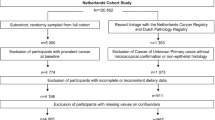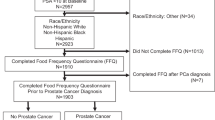The relationship between risk of prostate cancer and dietary intake of energy, fat, vitamin A, and other nutrients was investigated in a case-control study conducted in Ontario, Canada. Cases were men with a recent, histologically confirmed diagnosis of adenocarcinoma of the prostate notified to the Ontario Cancer Registry between April 1990 and April 1992. Controls were selected randomly from assessment lists maintained by the Ontario Ministry of Revenue, and were frequency-matched to the cases on age. The study included 207 cases (51.4 percent of those eligible) and 207 controls (39.4 percent of those eligible), and information on dietary intake was collected from them by means of a quantitative diet history. There was a positive association between energy intake and risk of prostate cancer, such that men at the uppermost quartile level of energy intake had a 75 percent increase in risk. In contrast, there was no clear association between the non-energy effects of total fat and monounsaturated fat intake and prostate cancer risk. There was some evidence for an inverse association with saturated fat intake, although the dose-response pattern was irregular. There was a weak (statistically nonsignificant) positive association between polyunsaturated fat intake and risk of prostate cancer. Relatively high levels of retinol intake were associated with reduced risk, but there was essentially no association between dietary β-carotene intake and risk. There was no alteration in risk in association with dietary fiber, cholesterol, and vitamins C and E. Although these patterns were evident both overall and within age-strata, and persisted after adjustment for a number of potential confounding factors, they could reflect (in particular) the effect of nonrespondent bias.
Similar content being viewed by others
References
Nomura AMY, Kolonel LN. Prostate cancer: a current perspective. Epidemiol Rev 1991; 13: 200–27.
Pienta KJ, Esper PS. Is dietary fat a risk factor for prostate cancer? JNCI 1993; 85: 1538–40.
Pollard M, Luckert PH. Promotional effects of testosterone and dietary fat on prostate carcinogenesis in genetically susceptible rats. Prostate 1985; 6: 1–5.
Clinton SK, Palmer SS, Spriggs CE, Visek WJ. Growth of Dunning transplantable prostate adenocarcinomas in rats fed diets with various fat contents. J Nutr 1988; 118: 908–14.
Rotkin ID. Studies in the epidemiology of prostatic cancer: expanded sampling. Cancer Treat Rep 1977; 61: 173–80.
Graham S, Haughey B, Marshall J, et al. Diet in the epidemiology of carcinoma of the prostate gland. JNCI 1983; 70: 687–92.
Mishina T, Watanabe H, Araki H, Nakao M. Epidemiological study of prostatic cancer by matched-pair analysis. Prostate 1985; 6: 423–36.
Heshmat MY, Kaul L, Kovi J, et al. Nutrition and prostate cancer: a case-control study. Prostate 1985; 6: 7–17.
Talamini R, La Vecchia C, Decarli A, Negri E, Franceschi S. Nutrition, social factors and prostatic cancer in a Northern Italian population. Br J Cancer 1986; 53: 817–21.
Kaul L, Heshmat MY, Kovi J, et al. The role of diet in prostate cancer. Nutr Cancer 1987; 9: 123–8.
Ross RK, Shimizu H, Paganini-Hill A, Honda G, Henderson BE. Case-control studies of prostate cancer in blacks and whites in southern California. JNCI 1987; 78: 869–74.
Ohno Y, Yoshida O, Oishi K, Okada K, Yamabe H, Schroeder FH. Dietary β-carotene and cancer of the prostate: a case-control study in Kyoto, Japan. Cancer Res 1988; 48: 1331–6.
Kolonel LN, Yoshizawa CN, Hankin JH. Diet and prostatic cancer: a case-control study in Hawaii. Am J Epidemiol 1988; 127: 999–1012.
Mettlin C, Selenskas S, Natarajan MS, Huben R. Betacarotene and animal fats and their relationship to prostate cancer risk. Cancer 1989; 64: 605–12.
West DW, Slattery ML, Robison LM, French TK, Mahoney AW. Adult dietary intake and prostate cancer risk in Utah: a case-control study with special emphasis on aggressive tumors. Cancer Causes Control 1991; 2: 85–94.
Snowdon DA, Phillips RL, Choi W. Diet, obesity, and risk of fatal prostate cancer. Am J Epidemiol 1984; 120: 244–50.
Hirayama T. A large scale cohort study on cancer risks by diet—with special reference to the risk reducing effects of green-yellow vegetable consumption. In: Hayashi Y, ed. Diet, Nutrition and Cancer. Tokyo, Japan: Japan Sci. Soc. Press, 1986: 41–53.
Mills PK, Beeson WL, Phillips RL, Fraser GE. Cohort study of diet, lifestyle, and prostate cancer in Adventist men. Cancer 1989; 64: 598–604.
Severson RK, Momura AMY, Grove JS, Stemmermann GN. A prospective study of demographics, diet, and prostate cancer among men of Japanese ancestry in Hawaii. Cancer Res 1989; 49: 1857–60.
Hsing AW, McLaughlin JK, Schuman LM, et al. Diet, tobacco use, and fatal prostate cancer: results from the Lutheran Brotherhood cohort study. Cancer Res 1990; 50: 6836–40.
Giovannucci E, Rimm E, Colditz GA, et al. A prospective study of dietary fat and risk of prostate cancer. JNCI 1993; 85: 1571–9.
Le Marchand L, Kolonel LN, Wilkens LR, Myers BC, Hirohata T. Animal fat consumption and prostate cancer: a prospective study in Hawaii. Epidemiol 1994; 5: 276–82.
Morgan RW, Jain M, Miller AB, et al. A comparison of dietary methods in epidemiologic studies. Am J Epidemiol 1978; 107: 488–98.
US Department of Agriculture. Composition of Foods: Raw, Processed, Prepared. Washington, DC: USDA, Agriculture Research Service, 1968; Agriculture Handbook No. 8, Expansion (March) 1972.
McCance RA, Widdowson EM. The composition of foods. In: Paul AA, Southgate DAT, eds. The Composition of Foods., London, UK: HM Stationery Office, 1978.
Paul AA, Southgate DAT. McCance and Widdowson's ‘The composition of foods’: dietary fiber in egg, meat and fish dishes. J Hum Nutr 1979; 33: 335–6.
Wiles SA, Nettleton PA, Black AE, Paul AA. The nutrient composition of some cooked dishes eaten in Britain. A supplementary food composition table. J Hum Nutr 1980; 34: 189–223.
Southgate DAT. Determination of carbohydrates in foods. II. Unavailable carbohydrates. J Sci Food Agric 1969; 20: 331–5.
US Department of Agriculture. Food Yields: Summarized by Different Stages of Preparation. Washington, DC: USDA, Agriculture Research Service, 1956: Agriculture Handbook No. 102.
Breslow NE, Day NE. Statistical Methods in Cancer Research. Vol. 1. The Analysis of Case-control Studies. Lyon, France: International Agency for Research on Cancer, 1980, IARC Sci. Pub. No. 32.
Kipnis V, Freedman L, Brown CC, Hartman A, Schatzkin A, Wacholder S. Interpretation of energy adjustment methods for nutritional epidemiology. Am J Epidemiol 1994; 137: 1376–80.
Jain M, Howe GR, Harrison L, Miller AB. A study of the repeatability of dietary data over a seven year period. Am J Epidemiol 1989; 129: 422–9.
Jain M, Howe GR, Johnson KC, Miller AB. Evaluation of a diet history questionnaire for epidemiologic studies. Am J Epidemiol 1980; 111: 212–9.
Midgette AS, Baron JA, Rohan TE. Do cigarette smokers have diets that increase their risk of coronary heart disease and cancer? Am J Epidemiol 1993; 137: 521–9.
Willett WC. Nutritional Epidemiology. New York, NY (USA): Oxford University Press, 1990: 250.
Bullough WS. Mitotic activity and carcinogenesis. Br J Cancer 1950; 4: 329–36.
Chandra RK. Immune response in overnutrition. Cancer Res 1981; 41: 3795–6.
Forsum E, Hillman PE, Nesheim MC. Effect of energy restriction on total heat production, basal metabolic rate, and specific dynamic action of food rats. J Nutr 1981; 111: 1691–7.
Gann PH, Hennekens CH, Spriggs FM, Grodstein F, Giovannuci EL, Stampfer MJ. Prospective study of plasma fatty acids and risk of prostate cancer. JNCI 1994; 86: 281–6.
Rose DP, Connolly JM. Effects of fatty acids and eicosanoid synthesis inhibitors on the growth of two human prostate cancer cell lines. Prostate 1991; 18: 243–54.
Moon RC. Comparative aspects of carotenoids and retinoids as chemopreventive agents for cancer. J Nutr 1989; 119: 127–34.
Steinmetz KA, Potter JD. Vegetables, fruit, and cancer. II. Mechanisms. Cancer Causes Control 1991; 2: 427–42.
Author information
Authors and Affiliations
Rights and permissions
About this article
Cite this article
Rohan, T.E., Howe, G.R., David Burch, J. et al. Dietary factors and risk of prostate cancer: a case-control study in Ontario, Canada. Cancer Causes Control 6, 145–154 (1995). https://doi.org/10.1007/BF00052775
Received:
Accepted:
Issue Date:
DOI: https://doi.org/10.1007/BF00052775




